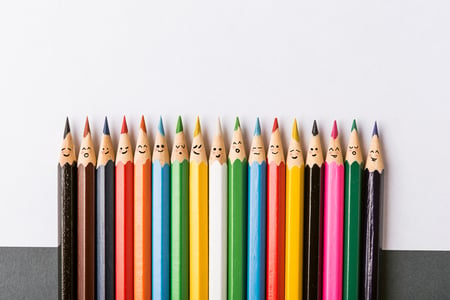
Notes from the Classroom
NOTES FROM THE CLASSROOM gives you an inside look at the exciting and innovative teaching and learning that is happening across the Whitby campus.
Middle School
Individuals & Societies: Participatory Action Research (Grade 6/2022)
Lower School
Individuals & Societies: Participatory Action Research
As is the tradition each Spring, Whitby’s 6th graders have been studying environmental justice in their Individuals and Societies classes. For their assessment in this unit, students engage in Participatory Action Research. This involves doing a deep dive into an environmental issue of their choosing, consulting experts in the field to supplement their research, and then taking an action to try to effect some kind of change relating to their issue.
For many students, the action they selected was to raise awareness about their issue in the Whitby community. At best, one of the community’s many changemakers might take an interest in one of these issues and help promote meaningful change. At the very least, they hope that each member of the community will make small changes that will collectively help improve these serious issues, which are as follows. Check them out!
| SAMAYA DAWKINS | Plastic Pollution | GRACE RUBINSTEIN | Factory Farming and Meat Pollution |
| KESHAV GOPAL | Nuclear Energy | SINYA JINDAL | The Water Crisis |
| SILAS HOFFMAN | Electric Cars | VASILIKI LAHAIE-DRINEA | Light Pollution |
| KENT COMO | Overfishing |
Belong is a glimpse of Participatory Actions from previous years.
|
E-Waste by Anya Nadel |
Deforestation by Ying Yin Chen |
|
Environmental Impact of Food Waste by Nikki Samios |
Ocean Waste by Lainie Geyer |
|
Car Pollution by Hailey Holovach |
Pollution from Trucks and Buses by Esteban Orozco |
|
Pollution from Fertilizer by Emi Gil Zalis |
Ocean Acidification by Sami Netter |
|
Deforestation by Nicholas Shklovsky |
Fracking by Ayana Banerjee |
|
Invasive Species by Maya Narendula |
Pollution from Planes and Ships by Cody Cezzar |
|
Desertification by Yasmeen Hokail |
On the Pond: Micro-Ecosystem
.png?width=150&name=IMG_20210428_142038%20(1).png)
5th-grade students are in the midst of a unit of inquiry called the Biology of Energy that states, "In order to meet growing demands for food, societies often use new technologies with consequences to global environments and the movement of energy that could disrupt the balance of relationships."
What better way to study micro-ecosystems than to participate in a lab outdoors at the Whitby Pond. This particular activity was a Study of Diversity of the different populations that make up the community for a small micro-ecosystem contained inside areas defined by a hula-hoop. Each of the four groups set out to investigate using a variety of instruments. The data they collected will be used to evaluate if it is a healthy ecosystem and to estimate the population density for some of the different populations they have identified. We will also look to see if we can identify various interdependent relationships.
.jpg?width=200&name=IMG_20210428_142518%20(1).jpg)
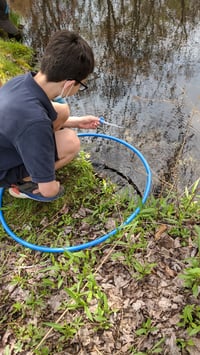
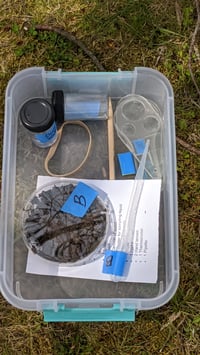
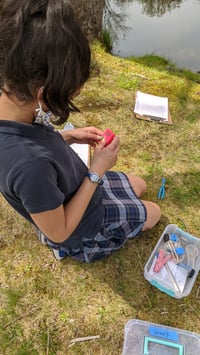
Middle School Alumni Speaker Series
Whitby graduates have gone on to attend top private and public schools, and their accomplishments are impressive. Our alumni are a great source of inspiration, and we are connecting our students and alumni with the launch of our Middle School Alumni Speaker Series.
Seneca Schwartz (Class of 2018) kicks off the series. Students viewed Seneca's Ted Talk "Why don't more girls like jumping off walls" and submitted their questions. Seneca came into the Middle School classrooms via Zoom and facilitated a great Q&A session, sharing her passion for parkour and her experiences in a sport dominated by males.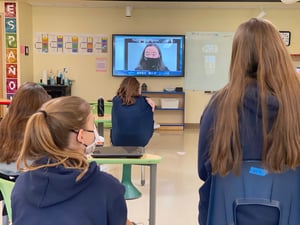
Our Middle School students enjoyed hearing about inequality in sports and how a girl navigates in a male-dominated sport. Inspired by Seneca, one of the boys shared how he felt participating in a girl-dominated sport like gymnastics. How brave and self-aware is this young man to make this connection, and what a testament to our Middle School culture that he felt safe to voice this to all his peers.
Ryan Gross (Class of 2013 )
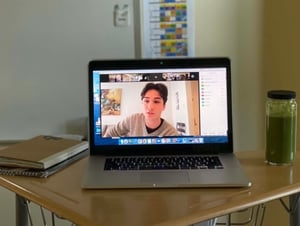
Ryan met with our Middle School students to talk about his philosophies and experiences. He shared how the Whitby educational principles shaped the foundation for his love of exploration, creating, and openness. Ryan described himself as a "multidisciplinary creative thinker and self-starter with an eye for design, space, and style."
Since graduating from Whitby in 2013, Ryan has been involved in numerous creative and professional projects in art, fashion, and design. Most recently he started his own business, Ryan Matthew Interiors that focuses on curating spaces that connect to people's personal stories and values. Ryan will graduate from Parson's School of Design in May 2021.
Upcoming Speakers
Sophia Viscarello (Class of 2017)will be next in line. She also has a Ted Talk she will share talking about striving for perfection and how this can hinder success and joy of learning.
Equal, But Not the Same: Poetry Expressions
LOWER SCHOOL - GRADE 4
The 4th grade finished a unit called "Equal, But Not the Same" where we looked at our own identity, and stereotypes about boys and girls. We looked at common stereotypes and reflected on them, and we also decided what parts of our identity were important to us. Maybe one person values culture, where they come from, the language they speak, if they are a boy or a girl, or the activities, sports, and hobbies they enjoy.
We decided identity is what makes each person unique, and each person should have the freedom to choose their identity. It is our responsibility to value and respect other identities as well.
As part of this inquiry, we looked at poetry as a way to express identity. We learned about poetic devices, such as rhyme, repetition, and alliteration, to do this. We each wrote a poem that either expressed something about our identity and what makes us all unique, or we wrote about changing the stereotypes society has about what boys should like and what girls should look like, act, or do. We wanted to raise awareness with our poems about the importance of identity, and the problem with stereotypes. (Introduction by Sahana Bhat.)
